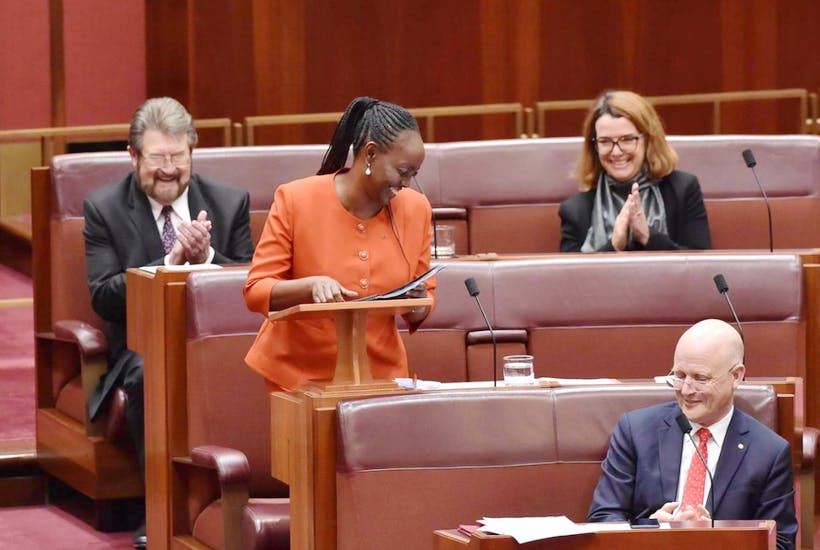In a 1943 wartime broadcast on social security, Robert Menzies told the country that “there are amazing possibilities in every boy and girl”. The latest parliamentary recruit to the Liberal Party, Senator Lucy Gichuhi, is a striking testament to this great truism voiced by its founder. Born as one of ten children in a small Kenyan village outside Nairobi, the girl who spent her childhood on the dirt floors of a lowly bark hut today sits on the red leather of the Australian Senate. Through a combination of intellect, industry and what she would see as divine blessing, Senator Gichuhi is one of Australia’s great immigrant success stories. The inspiring tale of a Kenyan-born accountant and lawyer, who excelled in her professions, raised a family and served her community to one day attain high office.
So it is fitting, therefore, that the Party founded by the son of a Jeparit storekeeper who rose to the prime ministership has just welcomed the daughter of a Kenyan grazier elected to the Australian Senate. Announcing her decision to join the Liberal Party on 2 February, the former crossbencher remarked that “the Liberal Party is the closest in its core foundational values and principles to those that I aspire to in my own life”. Warmly applauding Senator Gichuhi’s decision to join the Liberal team, Prime Minister Turnbull rightly observed that her values are “fundamentally Liberal values”. Namely, “freedom of choice, conscience, thought and belief, a fair go, mutual obligation and contributing back to society”. So how does the Adelaide-based Senator embody the values and traditions of her new Party?
Drawing from her own church fellowship and community, Senator Gichuhi brings firstly a balanced ethic of individualism to the modern Liberal Party, one that is wholly faithful to the vision of Menzies. Like Menzies, she affirms the dignity and freedom of each individual, but rejects an arid and selfish individualism that negates the value of community. Society is not a collection of atomistic individuals but an interdependent community of citizens with rights and mutual obligations. Just as Menzies reminded Australians that “we are all members of one another”, Gichuhi speaks of the “need to encourage social and political interaction that goes beyond individualism” to “preserve Australia as a great nation in the world”.
Before her decision to join the Liberal Party, Senator Gichuhi was already committed to the Liberal philosophy of social welfare with its approach to giving people a hand-up rather than a hand-out. The party’s guiding philosophy of social welfare was best articulated by its founder who said in 1945 that “The purpose of all measures of social security is not only to provide citizens with some reasonable protection against misfortune but also to reconcile that provision with their proud independence and dignity as democratic citizens”. As a new arrival to Australia in 1999, Gichuhi received unemployment benefits but in the long term decided not “to be a victim and receive handouts”. Instead, the enterprising immigrant chose “the more challenging but empowering road” to find a job and “learn how to balance work and family life”. While maintaining government assistance to those in need, she concurs with Malcolm Turnbull that “a job is the best from of welfare”.
Her Liberal philosophy of social welfare extends from individuals to businesses. In June 2017, she called for the “corporate welfare mentality” to give way to a “sustainable business model mentality”. Instead of simply dolling out money, the government should give “industry a sustainable approach, including better pricing for essential services, in order to retain existing companies and attract new ones”. As the United States and Australia canvass the merits of corporate tax cuts, this is yet another measure that would potentially boost business productivity and job creation.
Importantly, Senator Gichuhi identifies with Menzies’ own tradition of humane social reform, particularly with her abiding interest in the wellbeing of older Australians. In what was one of Menzies’ seminal social reforms, his government passed the Aged Person’s Homes Act in 1954 to revolutionise Australian aged care – allowing seniors to dwell in homes rather than institutions. In a far cry from the glum Dickensian asylums of old, these personalised, new abodes would allow older people to live independently while having the opportunity to mix freely with others. Continuing this vision of Menzies, Gichuhi told the Senate in her 2017 inaugural speech that “The need to value and look after our seniors is central to any civil and noble society”. Desiring to personalise the care of older Australians, she called for the staff-to-resident ratio for aged-care homes in Australia to be addressed. Bringing concerns like this to the fore will help remind the public that the Liberal Party, like its founder, is in touch with the human and spiritual as well as the material.
At a time when the Liberal Party is internally grappling with its identity and purpose, Senator Gichuhi bridges the old with the new. Her traditional values of faith, family and patriotism resonate with the Party’s conservative support base, while at the same time, her identity as a proud Australian of Kenyan origin exemplifies modern Australia as a culturally diverse nation with opportunity for all.
To be sure, the freshly-minted Liberal Senator is still on the cusp of her parliamentary career yet she brings to public life, a well-articulated Liberal philosophy forged by a remarkable life-story of achievement and service. This will undoubtedly bode well for her to make a rich contribution to the centre-right of Australian politics and indeed the common good of the nation.
David Furse-Roberts is an Adjunct Research Fellow at the Menzies Research Centre and author of Menzies: The Forgotten Speeches (Connor Court 2017)
Got something to add? Join the discussion and comment below.
Got something to add? Join the discussion and comment below.
Get 10 issues for just $10
Subscribe to The Spectator Australia today for the next 10 magazine issues, plus full online access, for just $10.


























Comments
Don't miss out
Join the conversation with other Spectator Australia readers. Subscribe to leave a comment.
SUBSCRIBEAlready a subscriber? Log in